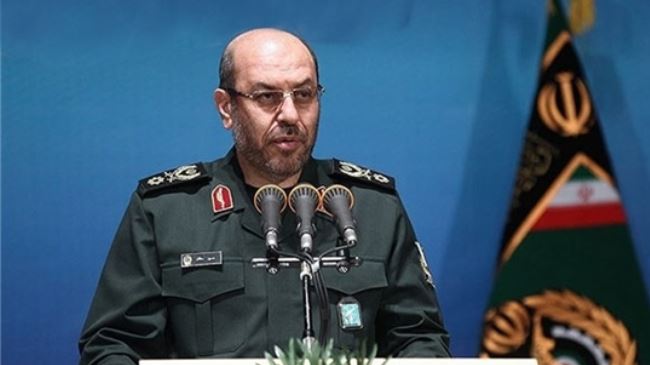 Iranian Defense Minister Brigadier General Hossein Dehqan[/caption]
Iranian Defense Minister Brigadier General Hossein Dehqan[/caption]TEHRAN (FNA)- Iranian Defense Minister Brigadier General Hossein Dehqan underlined that the successful launch and orbiting of Iran's home-made 'Fajr (Dawn)' satellite displayed that sanctions and pressures have failed to block the country's progress.
"Today, we have a word to say in many technological fields everywhere in the world and we embrace increasing honor and glory each day," Dehqan said in Tehran on Tuesday.
He said enemies are attempting to show that sanctions have succeeded in bringing the Iranian nation to its knees and halting its progress, while they have failed. "The sanctions haven�t stopped Iran's scientific growth; the youth of the Islamic Iran have built the Fajr satellite and sent it into the Earth's orbit successfully while the country has been under sanctions."
Dehqan stressed that all stages of building the Fajr satellite, including its after-launch tracking, are being fulfilled by the young Iranian scientists.
The Fajr satellite was sent into the orbit on the back of the home-made Safir-e Fajr launcher on Monday.
After ordering its launching, Iranian President Hassan Rouhani said the country had ushered into a new era of aerospace technology by sending a new home-made satellite into orbit.
"The prominent Iranian scientists and thinkers have entered a new stage in area of space sciences," Rouhani said after Iran launched its home-made Fajr satellite into orbit.
"The government is determined to continue the path of national progress and God willing, we will reach a stage in the coming when all the country's needs in the space field will be met by the hands of the powerful Iranian scientists and based on indigenized technology," he added.
In relevant remarks yesterday, Dehqan congratulated the Iranian government and nation on the successful launch and orbiting of the satellite.
The fully home-grown satellite which has been built by experts at the defense ministry's Aerospace Industries Organization proves the Islamic Republic of Iran's high capabilities to launch satellites into orbit, General Dehqan said.
"It is also another indicator of the country's flourishing scientific growth in the state-of-the-art technologies," he added.
In October, Deputy Head of Iran Space Agency (ISA) Hamid Fazeli announced that Tehran was preparing to orbit three new home-made satellites, called Zafar (Triumph), Tolou (Sunrise) and Pars, from more powerful launchers and on the back of bigger carriers in the near future.
"Launching the under-construction satellites, including Sharifsat and Nahid, are also among the short-term plans of the ISA," he added.
Also, Iranian Vice-President for Executive Affairs Mohammad Shariatmadari told reporters in the same month that Iran hoped that its Sharifsat satellite would be sent into orbit this year.
Fazeli had announced in May that Iran planned to launch three home-made monitoring satellites into orbit in the next Iranian calendar year (March 2015-March 2016).
"Zafar, Tolou and AUT Sat will be sent into space onboard the Simorq satellite carrier," he said.
Fazeli noted that the satellites would transmit images of the Earth's surface to ground stations.
Zafar will be sent into a geostationary orbit, which is a circular orbit around 36,000 kilometers (22,320 miles) above the Earth's equator.
The satellite will reportedly have a lifespan of one year and six months, and will capture images and transmit them to stations on earth.
Tolou satellite will also carry out remote sensing and topography missions, and will travel in an orbit of 500 kilometers above from the Earth�s equator.
By Fars News Agency
The Iran Project is not responsible for the content of quoted articles.










